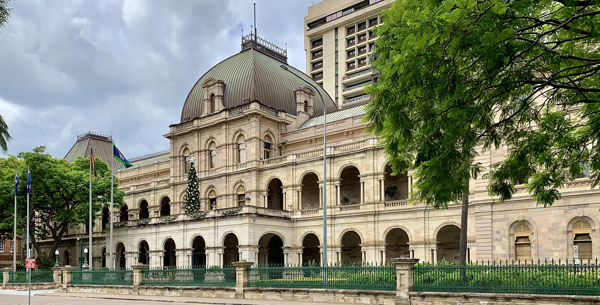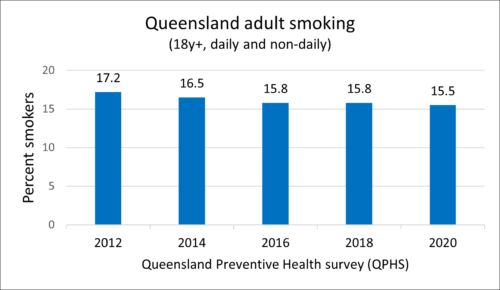
Queensland’s parliamentary inquiry into vaping a political stunt
Posted on March 13, 2023 By Colin
QUEENSLAND IS CONTINUING ITS VENDETTA against vaping, announcing a parliamentary inquiry to investigate the prevalence of youth vaping and to confirm the "potential dangers". This political stunt is a waste of taxpayers' money which should be spent on reducing the stagnating adult smoking rates. The motive appears to be to justify further restrictions on vaping.
Queensland has the highest state smoking rate in Australia. The Premier falsely claims that “smoking continues to fall in Queensland”. This is not true. The adult smoking rate has not declined significantly since 2014, as the following graph shows, based on Queensland Preventive Health Survey data.

In other words, the problem is not youth smoking or vaping but that adult smokers are not quitting. This should be the focus of a parliamentary inquiry.
The flawed gateway theory
The government claims that “people who try vaping are three times more likely to take up smoking” (the gateway theory), based on flawed research from the Australian National University. However, this claim has been dismissed in a peer-reviewed analysis and no correction has been issued by ANU.
Vaping is associated with later trying smoking, but there is no evidence that vaping causes young people to take up smoking if they would not have otherwise done so
The association between vaping and later smoking is more likely due to the fact that young people who experiment with vaping are simply more prone to take risks such as smoking, drinking alcohol, illicit drug use (‘common liability’).
In fact, the evidence suggests that vaping diverts young people away from smoking than encourages them to smoke. The decline in youth smoking rates has accelerated after vaping became popular in the UK, New Zealand and the United States.
Exaggerated risks
Young people should not vape or smoke, although many will do one or both, especially if we tell them not to.
Vaping by young people who have never smoked is likely to carry some health risk, although this is likely to be far less than from smoking
There are substantially fewer toxic chemicals in vapour than in tobacco smoke and those that are present occur at far lower concentrations.
Further, most vaping by never-smokers is infrequent and short-term and this pattern is associated with lower levels of exposure and health risk than frequent or sustained use. Serious harm is very rare. Young smokers who switch to vaping are likely to have substantial health improvements.
There is evidence from animal studies that nicotine causes harmful effects on the adolescent brain but it is uncertain if these findings can be extrapolated to humans.
Vaping can cause nicotine dependence in a small minority of never-smokers rather than a “new generation addicted to nicotine”.
Vaping nicotine does not cause the serious lung disease E-cigarette or Vaping Associated Lung Injury (EVALI) or seizures. There is a rare risk of burns and injuries from lithium-battery explosions, but none have been reported from disposables, the most popular type of device used by young people.
Queensland does not need a parliamentary inquiry to discover the health risks of vaping. There is abundant international research available from leading, independent health organisations, for example here, here and here.
How to reduce youth vaping
Youth vaping has been created by the flawed prescription-only regulations that have led to a thriving black market, freely selling unregulated nicotine vapes to young people. Queensland Health has made minimal effort to police these illegal sales.
The solution is to make nicotine for vaping a legal adult consumer product sold from licensed retail premises, with strict age verification and severe penalties and loss of licence for underage sales
This model is working well in the United Kingdom and New Zealand and has led to substantial improvements in public health.
The predictable outcome of this inquiry
This political stunt will establish what we already know, that many young people are buying vapes on the black market. It will also conclude that vaping is a serious threat to young people’s health. It isn’t.
It will generate further moral panic about youth vaping and make no difference to black market sales. Kids will continue to vape
Most importantly, it completely ignores the needs of the 410,000 adult Queenslanders who still smoke and will deter some from switching to this lifesaving alternative.
Go to Top